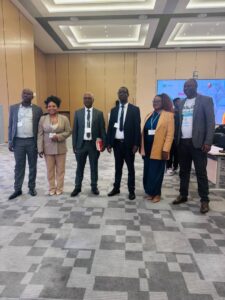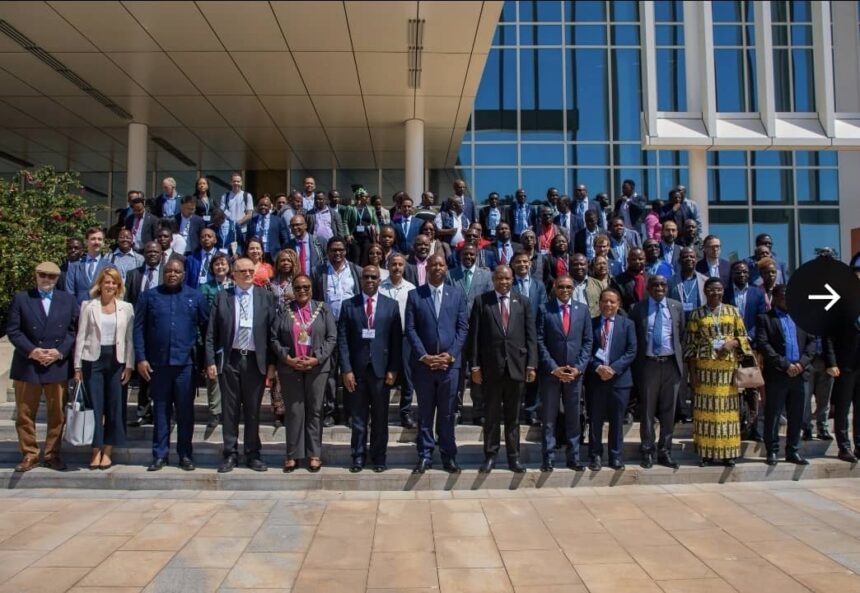…As TRALARD showcases its best adaptation actions that contribute to the implementation of Zambia’s NAP
By SIMON MUNTEMBA
THE escalating impacts of climate-induced disasters are devastating vulnerable communities especially in the least developed countries, including those in East and Southern Africa. To protect people, livelihoods and economies, countries have prioritized the development and implementation of National Adaptation Plans (NAPs), which serve as crucial roadmaps to build climate resilience.
It is against this background that the largest annual global climate adaptation event, NAP Expo 2025, under the theme “Innovations in the Process”, was held at Mulungushi Conference Centre in Lusaka, Zambia from 12–15 August 2025, with an urgent call for scaled up investment to save lives, lift living standards and boost economic growth.
Organized by the least developed countries expert group under the United Nations Framework Convention on Climate Change (UNFCCC), the NAP Expo is a flagship global event that fosters knowledge exchange, showcases best practices, and builds strategic partnerships to advance climate adaptation efforts. It plays a pivotal role in supporting countries to formulate and implement their NAPs.
The 10th global NAP Expo, attended by over 400 delegates, including government officials, technical experts, indigenous leaders, private sector representatives, and development partners from across the world, was focused on strengthening countries’ capacity to advance NAPs ahead of COP30 in Brazil, and closing the financing gaps that threaten effective climate adaptation. The event also marked a significant milestone as the updated technical guidelines for the NAP process was launched, with various activities highlighting key concepts and innovations like the use of new AI tools to build climate resilience.
Various sessions strengthened inclusive stakeholder engagement in the NAP process by promoting the incorporation of diverse values and worldviews of indigenous peoples and the experiences of local communities, as well as private sector involvement, with a strong focus on vulnerable communities, gender-responsiveness and youth participation.
One highlight of the implemented projects contributing to addressing climate change impacts in line with Zambia’s NAP is the Transforming Landscapes for Resilience and Development (TRALARD). Implemented by the Ministry of Green Economy and Environment with the support of the World Bank, the development objective of the TRALARD Project is to improve natural resource management in the northern region of Zambia in order to support sustainable livelihoods, and in the event of an eligible crisis or emergency, to provide immediate and effective response to the eligible crisis or emergency.
The TRALARD Project was among other projects that were highlighted and recognized for their positive contributions towards addressing the country’s vulnerability and resilience to climate change.
During the technical sessions, the project showcased how it has contributed to addressing the risks and vulnerabilities outlined in Zambia’s NAP 2023 priority sectors such as the agriculture, forestry, water, energy, tourism, infrastructure, and wildlife to enhance the country’s resilience to the impacts of climate change.
In line with Zambia’s NAP, the TRALARD project is supporting diversified livelihoods such as beekeeping, fish farming, gardening, goat rearing, piggery and poultry production, among vulnerable communities including persons living with disabilities as a way of promoting social inclusion. These interventions have created alternative livelihoods that rely less on natural resources, besides enhancing their resilience against climate shocks.
To address risks and vulnerabilities in the agriculture sector like crop failure and food insecurity due to droughts, the project is not only promoting climate-smart agriculture and encouraging crop diversification, but also providing climate information to farmers and other stakeholders through the installation of automated weather stations.
So far, 66,764 farmers consisting of 33,984 females and 32,780 males have benefited. They have been trained in climate smart agriculture under the project. The climate smart agriculture that these farmers are practicing after undergoing training include mulching, use of organic manure, minimum tillage, residue retention and intercropping. This has led to increased farming productivity and enhanced their adaptive capacities.
Further, the project has supported the construction of bulking centres which are productive climate resilient infrastructure meant to ensure proper storage of farmers’ produce and act as a marketing hub to improve farm produce pricing.
In addressing lack of access to markets for agricultural produce by subsistence farmers due to poor road networks or increased deterioration of road infrastructure, the TRALARD has supported the construction of climate-resilient embankments and crossing points. These infrastructure have improved access to inputs and markets including other social amenities such as schools and health facilities.
To tackle the loss of natural resource base in the face of climate change in line with the NAP, the project is promoting sustainable forestry management by raising awareness on the importance of forest, and supporting Community Forest Management Groups and agroforestry. Through the Forest Department, TRALARD has trained community members, including females as honorary forest officers to safeguard the forests. So far, about 380,000 hectares of forest have been put under community management.
In line with Zambia’s NAP goals and objectives, the TRALARD adaptation actions have contributed to reducing vulnerability, enhancing adaptive capacity, building resilience, and ensuring sustainable development in the face of climate change.
Using its experience, the project also showcased how multi-stakeholder collaboration—including NGOs, media, academia, and community groups—can strengthen awareness, foster behaviour change, and deliver co-benefits through sustainable land management.
Highlighting the key discussion points and take away messages from the TRALARD presentation during the technical session, Project National Coordinator, John Katongo Banda underlined the crucial role of multi-stakeholder collaboration in the execution of NAP.
Mr. Banda noted that adaptation thrives when there is multiple collaboration, reiterating TRALARD’s commitment to ensuring social inclusion of key populations.
The Project National Coordinator explained that multi-stakeholder collaboration embodies the “leave no one behind” principle and aligns closely with the call for inclusive NAPs.
Speaking earlier when he officially opened the Expo, Minister of Green Economy and Environment, Mike Mposha who warmly welcomed the delegates, highlighted several flagship efforts undertaken by the Zambian Government in dealing with climate change.
To ensure availability of climate information, Mr. Mposha stated that Zambia has rolled out more than 200 automated weather stations since 2021, covering every district and key water bodies in the country.
“The expanded network is delivering faster, more accurate, and highly localized weather and climate data, thereby empowering farmers to safeguard the nation’s food basket, guiding critical hydropower and energy decisions, helping the health sector predict climate-linked disease outbreaks, and driving sustainable growth across all sectors of the economy,” the Minister said.
Mr. Mposha also highlighted Zambia’s efforts in promoting climate-smart practices, such as permanent planting basins, ripping, crop rotation, and agroforestry, to boost small-scale farmers’ resilience and food security.
He further said that the Zambian Government has embedded weather-index insurance in its Farmer Input Support Programme, giving more than one million farmers a vital safety net against climate risks.
Delivering his keynote speech, Director of the Adaptation division at UNFCCC Youssef Nassef emphasized the importance of inclusive inspiration—from youth innovation to indigenous leadership and early adaptation pioneers among least developed countries.
Dr. Nassef said indigenous leadership are critical key stakeholders who should not just be consulted but embedded in decision-making, recognizing them as true leaders of adaptation innovations.
He also said that there was a need for participants to shift their adaptation mind-set—from reacting to climate risks to envisioning and back-casting from a resilient future.
“Much smarter and cheaper is investing in resilience up-front, because this not only saves lives and money, it delivers massive dividends across every sector and every community, transforming lives and economies for the better,” he stated.
The global 10th NAP Expo came to an end with a powerful reminder that adaptation is not a distant aspiration but an urgent, collective responsibility. From high-level commitments to grassroots innovations, the message from participants across the globe was that NAPs must be country-owned, inclusive, and treated as living frameworks that adapt as realities change.
Examples from Africa and beyond demonstrated how ecosystem-based approaches, improved soil and water management, and targeted investments can boost productivity and sustainability. The session also highlighted the need to combine nature-based and physical solutions – such as flood management, soil restoration, and climate-smart irrigation – to counter climate impacts.
Speakers from Nigeria, Somalia, Sudan, and partners like the NAP Global Network also demonstrated that climate adaptation can be a peacebuilding tool in fragile contexts. The emphasis was on inclusive, trust-building approaches that link adaptation with stability, proving that NAPs can be both climate strategies and a peace framework.
Indeed, as emphasized during the NAP Expo 2025, enhanced collaboration between governments, development partners and local communities, alongside international technical and financial support, is vital for implementing these plans and fostering long-term climate resilience.
By prioritizing climate adaptation actions, least developed countries including Zambia can break the cycle of recurring adversities, protect lives, restore ecosystems and build resilient communities.









